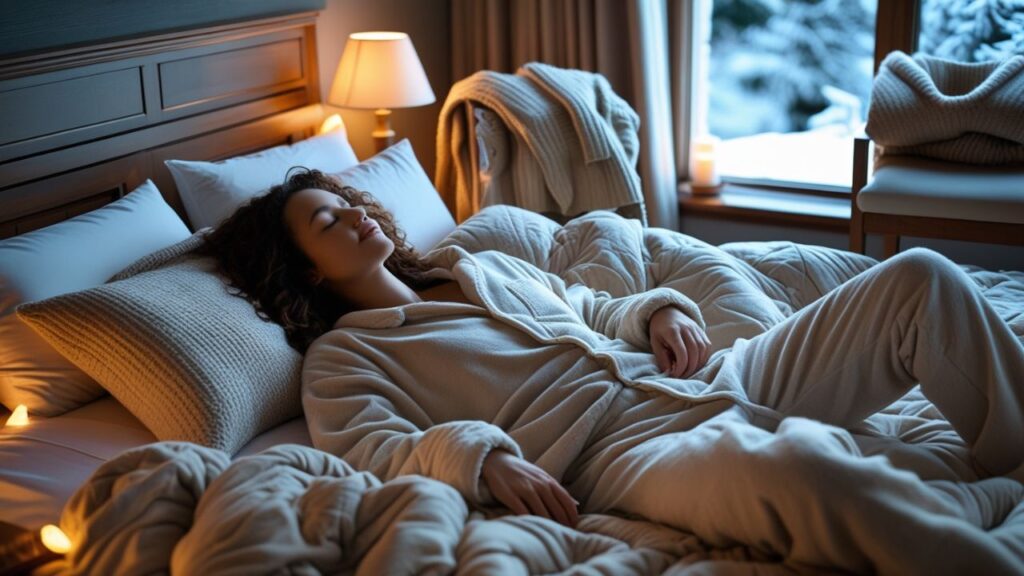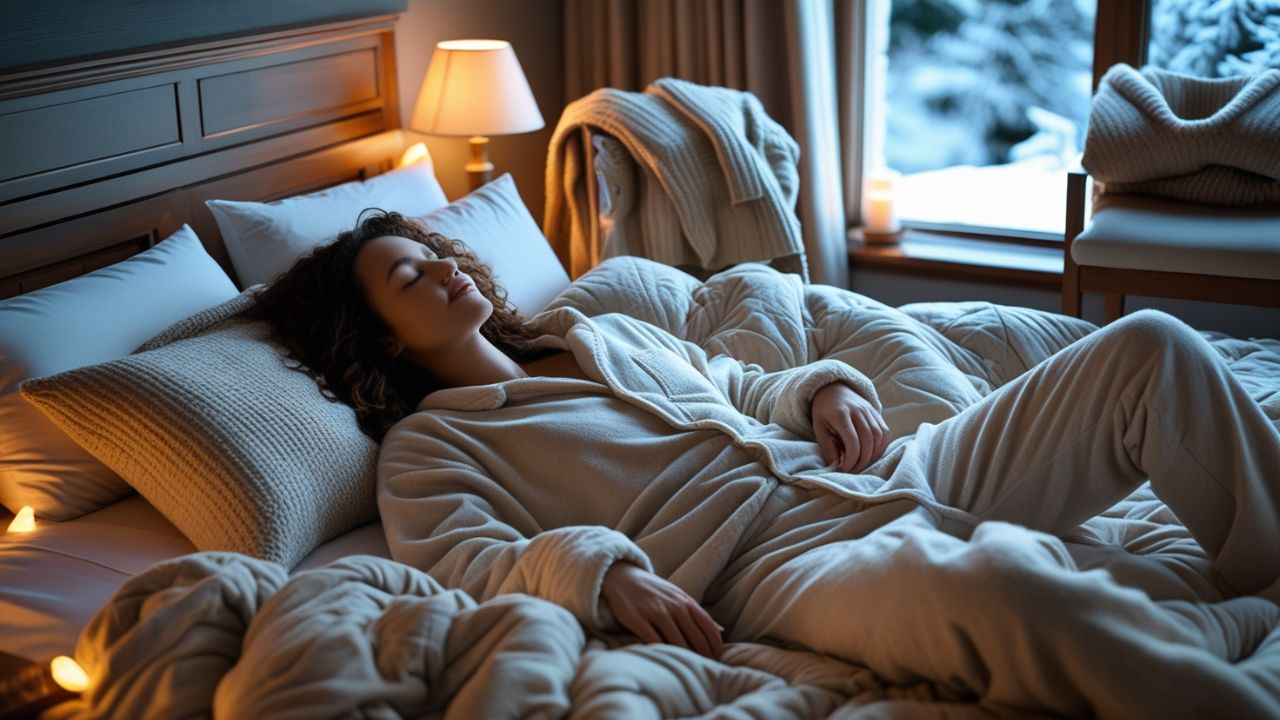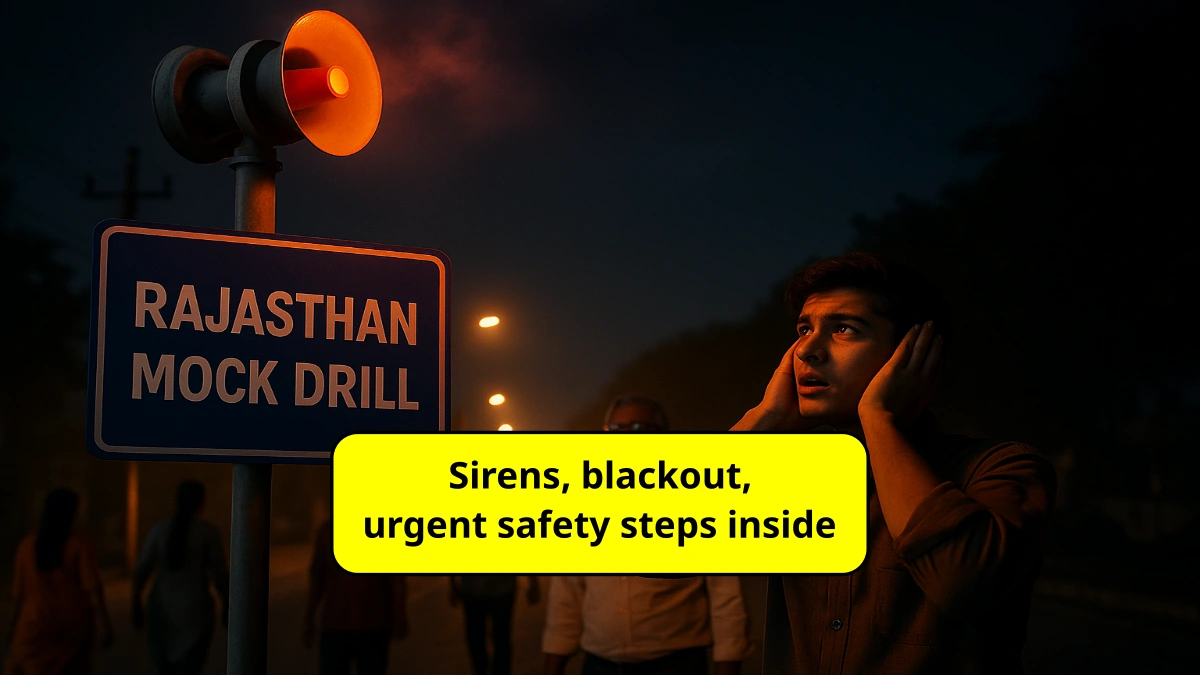When winter arrives, we all bundle up to stay warm. Some of us even wear sweaters, socks, or hats to bed to fight the chill. While it might seem cozy, sleeping in woolen clothes can actually cause discomfort and health problems. Let’s explore why this happens and how to sleep better in the cold months.
Why Woolen Clothes Aren’t Great for Sleeping
Wool is great at keeping you warm because it traps heat and doesn’t let air pass through easily. However, this can backfire while you sleep.
- Too Much Heat: Wool keeps your body heat in, which can make you too hot during the night.
- Sweating and Skin Issues: When your body overheats, you sweat, which can irritate your skin and even cause rashes or allergies.
- Disturbed Sleep: Feeling too hot or uncomfortable can interrupt your sleep.

Health Problems from Sleeping in Woolen Clothes
1. Skin Problems
Wool is rough on the skin and can cause irritation, especially if you already have sensitive skin or conditions like eczema. Sleeping in woolen clothes can worsen these issues, leading to itching, redness, or infections.
2. Breathing Trouble
Covering your head with blankets or sleeping in heavy wool can reduce the flow of oxygen, making you feel stuffy or out of breath. This is even more dangerous for people with asthma or other breathing issues.
3. Heart Strain
Overheating at night can put extra stress on your heart, especially if you have high blood pressure or heart problems.
4. Bad Sleep
Woolen clothes can feel tight or bulky, making it hard to relax. This can lead to restless nights and poor-quality sleep.
Who Should Be Extra Careful?
Sleeping in woolen clothes can be harmful for anyone, but some people are at higher risk:
- Heart Patients: Overheating can make their condition worse.
- Pregnant Women: Too much heat can be harmful to both mom and baby.
- Babies and Toddlers: Their skin is delicate, and they can’t regulate body temperature as well as adults.
- People with Skin Allergies: Wool can irritate sensitive skin.
- Diabetics: Tight or warm clothing can affect blood circulation, which is already a concern for diabetics.
How to Sleep Better in Winter
1. Wear Cotton or Loose-Fitting Clothes
Cotton is soft, breathable, and absorbs sweat, keeping your body temperature comfortable. Loose-fitting clothes also help you relax and sleep better.
2. Layer Smartly
Instead of heavy sweaters, wear lightweight layers like thermals under your sleepwear. This keeps you warm without overheating.
3. Use Warm Bedding
Invest in good blankets or duvets to stay warm. This way, you don’t need to rely on wearing woolen clothes to bed.
4. Adjust Your Room Temperature
Keep your bedroom cozy by using a heater or setting the thermostat to a comfortable level.
Is It Safe to Wear Socks to Bed?
Wearing socks can keep your feet warm, but it’s important to:
- Use clean socks, not the ones you wore during the day, to avoid infections.
- Choose light and breathable socks to prevent sweating.
- Avoid socks altogether if you’re prone to foot fungus or infections.
Extra Tips for Pregnant Women and Babies
- For Pregnant Women: Choose loose, cotton-based sleepwear. Avoid covering your head completely with blankets to ensure proper airflow.
- For Babies: Dress them in light, warm clothes and use breathable blankets instead of woolen ones to keep them safe and comfortable.
Common Winter Sleeping Myths
1. Myth: Woolen Clothes Are Best for Staying Warm
Fact: Layering with light clothes and using good blankets is just as effective and safer.
2. Myth: Covering Your Head Helps You Sleep Better
Fact: Covering your head can block oxygen flow and make breathing difficult, especially if you use a heavy blanket.
Read Now – New Year, New Look: Celebrity Style Inspiration for 2025
Final Thoughts
Staying warm in winter is important, but it’s even more important to stay comfortable and healthy while sleeping. Woolen clothes might seem like a good idea, but they can lead to overheating, skin issues, and poor sleep. Instead, wear light, breathable clothes, use warm bedding, and keep your room cozy for a good night’s rest.










